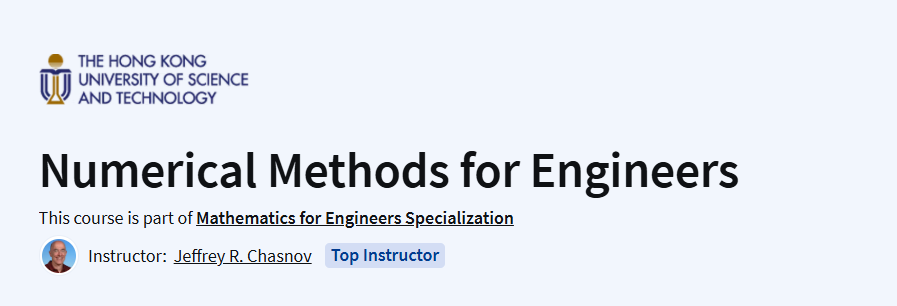What you will learn in Introduction to Linear Algebra Course
- Master vector/matrix operations and properties
- Understand linear transformations and their geometric interpretations
- Solve systems of equations using matrix methods (Gaussian elimination, LU decomposition)
- Learn eigenvalues/eigenvectors with practical applications
- Develop mathematical reasoning and proof-writing skills
- Gain computational skills using tools like MATLAB or Python (implementation varies by institution)
Program Overview
Vectors and Matrices
⏱️ 3-4 weeks
- Vector spaces and subspaces
- Matrix algebra and special matrices
- Linear independence and basis
- Dot products and orthogonality
Linear Systems
⏱️ 3-5 weeks
- Gaussian elimination
- Matrix inverses and determinants
- LU and QR factorizations
- Applications to circuit analysis and optimization
Transformations
⏱️ 4-5 weeks
- Matrix representations of linear transformations
- Change of basis
- Image and kernel spaces
- Geometric transformations (rotations, projections)
Eigen-theory
⏱️ 4-6 weeks
- Characteristic polynomials
- Diagonalization
- Spectral theorem
- Applications to dynamical systems
Get certificate
Job Outlook
- Essential for:
- Machine Learning (85% of roles require LA)
- Computer Graphics/Game Development
- Quantum Computing
- Engineering Simulations
- Salary Boost:
- STEM roles requiring linear algebra pay 18-25% premium
- Advanced Study:
- Required for graduate programs in CS, Physics, and Applied Math
Explore More Learning Paths
Strengthen your linear algebra skills with these curated courses designed to enhance your understanding of vectors, matrices, and their applications in data science, machine learning, and advanced mathematics.
Related Courses
Linear Algebra for Machine Learning and Data Science Course – Learn linear algebra concepts essential for machine learning algorithms, data analysis, and AI applications.
Essential Linear Algebra for Data Science Course – Master key linear algebra techniques, including matrix operations and transformations, tailored for data-driven problem-solving.
Algebra: Elementary to Advanced Specialization – Build a comprehensive foundation in algebraic concepts to support advanced studies in linear algebra and related fields.
Related Reading
Enhance your understanding of structured data and mathematical foundations:
What Is Data Management? – Explore how effective organization and handling of data are fundamental to applying linear algebra in analytics, AI, and scientific computing.
Specification: Introduction to Linear Algebra Course
|
FAQs
- Enhances your ability to model and solve complex systems using linear equations—crucial in physics, engineering, and economics.
- Bolsters your geometric intuition, aiding in spatial reasoning and optimizing designs.
- Builds abstraction skills, making you a sharper thinker in any analytical field.
- Teaches techniques like Gaussian elimination and vector space concepts that underpin algorithms in data science.
- Trains you to approach problems systematically—a transferable mindset for many disciplines.
- While highly recommended to pair it with a calculus course, you can still benefit from it independently.
- You’ll learn how linear algebra stands on its own, especially in understanding vector and matrix structures.
- Some calculus concepts—like limits or derivatives—are not required for this course.
- You may need to supplement your learning if your goal is calculus-dependent applications.
- The course’s mathematical focus provides clarity on foundational structures regardless of parallel calculus study.
- The course skillfully blends theory with real-world uses—like Markov processes and stochastic matrices.
- It uses geometric intuition to make abstract ideas like eigenvalues approachable.
- Applications are woven into lessons—connecting vector spaces to modeling and computational scenarios.
- You’ll practice translating abstract equations into concrete interpretations and use cases.
- This balance ensures you don’t just memorize formulas but can meaningfully apply them.
- Absolutely—linear algebra is essential for understanding PCA, regression, and many ML algorithms.
- You’ll learn about vectors, matrices, eigenvalues—all foundational for data transformations.
- The geometric intuition you gain helps interpret high-dimensional data and feature spaces.
- It’s the mathematical groundwork behind many AI models, enhancing your ability to grasp how algorithms work.
- Strong linear algebra knowledge sets you up for deeper ML study and practical implementation.
- Try solving real-world systems using Gaussian elimination, matrix inverses, or eigenvalue computations.
- Explore Linear Algebra Done Right or Gilbert Strang’s Intro to Linear Algebra for deeper insights.
- Apply concepts using Python (NumPy) or MATLAB to build hands-on computational experience.
- Join online forums or study groups to work through challenging problems collectively.
- Work on mini-projects—like modeling Markov chains or performing dimensionality reductions using live data.





